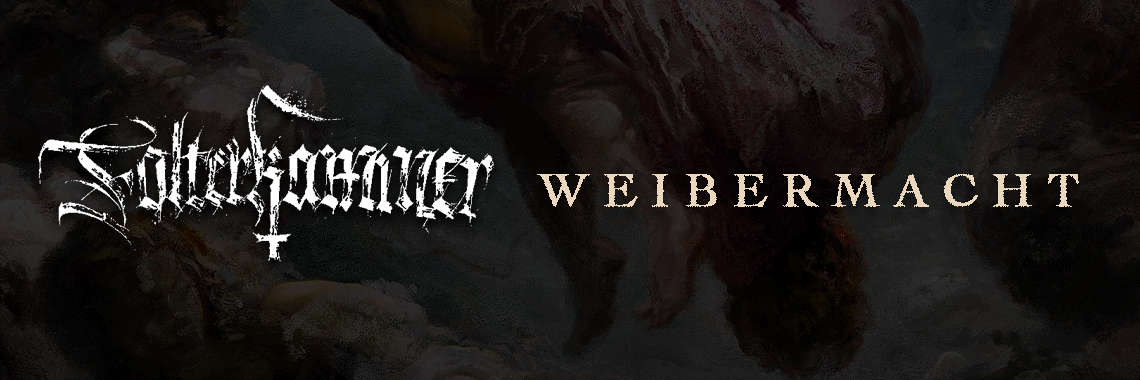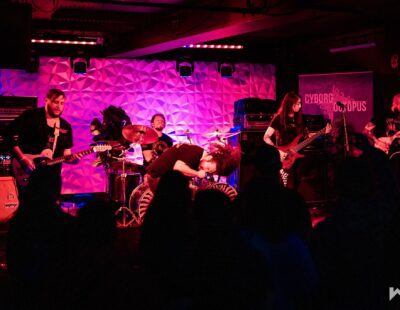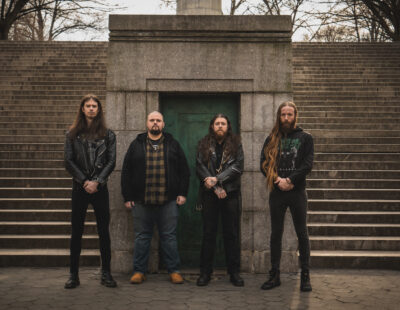
Last week, we brought you tales from the classroom (horrific!) thanks to Tomas Lindberg of At the Gates. We put our money (well, yours, really) where our not-school-appropriate mouth is and put a bunch of our merch on sale through September 2nd. And now we put you in touch with two more teachers who like to yell and throw elbows even when they’re not surrounded by confused adolescents: Mike Score of All Out War, and Mike Armine of Rosetta. Both men had insightful things to say when we spoke to them last year about their other chosen profession, and we were all ears.
Interview with Mike Score of All Out War
What comes first: hardcore/metal or teaching?
Obviously the hardcore/metal is a big part of my social life, but my professional life is teaching. I spend a lot of time working with kids. I run a club at the school that volunteers time within the community to do work to help out less fortunate people. We do a lot of charity work for this group called Backpack Snack Attack, which provides food for kids that go to the school I teach at that can’t afford food. On the weekends [students] fill up backpacks with food so the kids won’t be embarrassed. We do a lot with that organization, raising money for them. And just as far as getting kids ready for these standardized tests that they unfortunately have to take.
I teach in upstate New York at Valley Central High School which is right outside of Newburg. We’re a little less than an hour out of New York City. Right now, in New York State, there’s a big battle between the teachers’ union and Governor Cuomo. We’ll see where that goes. Right now, it appears like he’s winning, so hopefully that will change.
Is your choice to teach related to your music?
It’s totally related. My decision to become a teacher had a lot to do with my involvement in the music scene. The reason I became a teacher was because I really wanted to help kids not make the same mistakes I saw a lot of people I grew up with make. I like history and I like working with kids, and I had to find a career because obviously hardcore doesn’t pay the bills. It just was a natural progression.
In the 90s when we weren’t on the road, I would always go back to college – I went to SUNY New Paltz. Whenever we weren’t on the road or I knew we weren’t doing anything, I’d go to school for a semester. When All Out War really slowed down, it was a natural easy flow right into the teaching profession.
Do your students know about the band?
It’s funny, it goes in waves. I always talk to Matt from Hatebreed because he went to school to be a teacher before Hatebreed really took off. He has his degree in elementary [education]. Every few years there’ll be a clump of kids that are really into metal, and they’ll come to shows. Then that group will graduate and fade out, and you won’t see a group of kids that are really into Kreator or thrash stuff, you won’t see those kids for a while. I’m so out of it when it comes to some of these bands that are “metalcore” now – you’ll always see those kids – but as far as really cool metal stuff, those kids always seem to come in waves, every few years there’s a clump of them, and we’ll talk about Carcass and that kind of stuff. With me, it’s at a lull right now. The last group graduated last year. I was talking to them about going to see At the Gates, and that was really cool.
Are you different in the classroom than you are on stage?
I swear a lot more on stage. Before I was in the band, I was a quiet kid, and then I started doing the band, but I never really spoke in front of a crowd until played in All Out War. Playing in the band has really helped me become a better teacher. I totally believe that being a good teacher is performance art. You’ve got to be able to get up there and work a room. In that way, I think it’s very similar.
Do you have scheduling issues between the band and your teaching job?
We’ve had plenty of things we had to turn down because of [work], but the other guys work, too, so that all lumps together. We’ve been pretty lucky as far as doing a lot of fly-ins. For example, we just did Rainfest in Seattle – we flew out Saturday morning and flew back Sunday afternoon in time to go back to work. In January, we did the West Coast release shows for Xibalba’s new record, so we did L.A. and we did San Francisco. We flew out Friday, got there to play the shows so I flew out after work, got there in time to play the show, drove up to San Francisco, played that show and then there was a big snow storm that hit the East Coast – it was actually Super Bowl Sunday – and our flight got canceled and I thought that I was going to have to bang out of work but school got canceled because of the snow, so I lucked out. Definitely we’ve had some great offers that we had to pass up on, but at this point I’m just happy to still be able to do the band. We totally do this for the love of being in the band at this point.
What do you enjoy the most about teaching?
I like being able to feel like I made a difference. Your biggest success story is never the kid that is a straight-A student. That kid would have learned in spite of you; even if you were a bad teacher, that kid would have learned. The biggest gratification as far as I’m concerned is getting the kid that just squeaked by interested enough that they put in the work to just squeak by. I was a middle-of-the-road student, I wasn’t an honor roll student or in advanced classes. I was interested in history, that’s the only class that I really enjoyed so that was the class I excelled in. The other classes, I squeaked by.
What have your biggest challenges been?
All the changes. It just feels like they want teachers at this point to be cookie-cutter, no-personality pencil pushers, pushing the Common Core agenda along. That’s my biggest problem with teaching at this point. I hope that just disappears, and everything can go back to actually being a teacher with personality, and they stop pushing all this agenda from above. It just feels like every school year now there’s something coming down from above, and it’s all about checking off boxes. “How’s your paperwork? Did you hand in this, did you hand in that?” I didn’t sign on for that.
How do you see the connection between teaching and music?
I think it’s pretty seamless. I’ve always been interested in history. It ties in a lot lyrically. I teach history, so I’m pointing out to kids the hypocrisy. I’m constantly pointing out, “Don’t be fooled. A lot of this stuff has been written by the victors. History is more than just this textbook. You have to decipher it.” In the last few years with mostly just primary documents, I haven’t even been using the book. What I want from them now is, “Don’t tell me what a textbook says, tell me what this document says and why this person is saying this. Is it legit that this person is saying this? Or is there some kind of hidden agenda here? It’s great doing it that way because a lot of the kids seem to be more interested in trying to figure that out than they do with, “Go to page 280 and answer these questions.” You have some kids that think it’s really cool and some kids think you’re some kind of freak.
Interview with Mike Armine of Rosetta
Do you think your choice to teach and your choice of musical expression are related?
Fundamentally, in each facet, I’m just trying to untangle life’s quandaries. Like most vocalists (or so I would hope), my expression stems from frustration, confusion, anger, and disappointment. Rosetta’s obviously been a good outlet for me physically and mentally. The opportunity to sit, write, reflect, and actually catalog personal issues in the contexts of time truly is a blessing. It awards me the opportunity to move forward and away from obstacles. Whether it be drug abuse, family problems, etc., I have an opportunity to be less reactive and more proactive about not being “stuck”. Once a record comes out I actually feel like whatever it was I was writing about during the album that came before is truly behind me and unable to define the direction of my life anymore.
Teaching does much of the same. Instead of figuring things out alone, I get to evaluate, scrutinize, and bring closure to political, social, or psychological issues that my students and I are reading about (and sometimes dealing with personally). While I am there to teach them, they are also teaching me. The courses I teach allow me to have a really open dialog with young people where I’m free to be reassuring and comforting about the direction of their lives, yet critical and challenging about the way they’ve learned to assess their environment. On the flip side, they are also critical of me and have forced me to look at and think differently about myself.
What have you enjoyed most about teaching? What are your biggest challenges?
For a variety of reasons public education is a broken system. Lots of times all a young person needs is someone to validate, support, and recognize talent. Luckily my school has always had a pretty vibrant punk scene. Kill The Man Who Questions, Paint it Black, Armalite, R5 Productions, and Ceremony all had a root or two firmly planted at Haverford High School. That scene helped a lot of voiceless students, myself included (I went to the same high school that I currently teach at), find self-worth. Working with a student body that feels like they can’t, and watching them start to believe that they can, really is a worthwhile experience. Supporting the artistic and academic endeavors of a community of young people is pretty punk.
Teaching and working with/for young people is easy. The politics of education is hard. Infuriating in fact. It’s hard to wake up at 4am each day, put in 12 hours of solid work for someone other than yourself, only to have a politician slander your profession. Watching those same politicians underfund an entire school district (like former Gov. Corbett did in Philadelphia) is heartbreaking because you can actually see the effects of such a decision on a city/community. Good people suffer. Furthermore, this notion that everyone gets a trophy is eroding public education. It’s okay to be ordinary, and it’s okay to fail. Failure is a good thing. It’s how we learn to overcome. Failure is how we grow. And yet it’s almost impossible to fail a student without placing your own head under the guillotine. So the biggest challenge is not being able to let a student fall, to be there to help them up.
How does your rehearsal/recording/touring schedule impact your teaching schedule, and vice versa?
It’s more that my teaching schedule has impacted Rosetta’s touring schedule. We’ve missed out on a lot of great opportunities because of my teaching obligations. Rosetta has always been limited to having to do short tours over my vacations. I have to give it up to my band mates for accommodating me in that regard. Conversely, I have to be “sick” a lot for a few days on either side of a weekend to make a tour happen. While I’m openly abusing my privileges, my administration seems to support what I’m doing. It’s always funny to come home and have students/administration ask me “how I’m feeling”. A simple Facebook search will show them where I’ve been and what we’ve been doing. Everyone knows what I’m up to, and they know it’s important to me. So like my band mates who know teaching is important to me, my students and my administration work with me and not against me when it comes to making the few tours we do worthwhile. Neither my administration nor my band mates have asked me to make a choice one way or the other. I truly appreciate that. I’d like to think that we’ve been able to be a band this long in part because of my schedule. There is an alternate universe where I decided to do the band full time and not teach. In that universe does Rosetta stay together for 12+ years? Or does Rosetta burn out in 6 years like most bands that are on the 9 month touring cycle. That reality haunts me sometimes, but am very happy with the one I’m in.
Is Rosetta-vocalist-Mike a different personality than Mr. Armine, or do you feel these two parts of your life are reconciled, just different aspects of one philosophy?
It would be dishonest for me to be a different person in the classroom than I am at home, or on a tour. That being said, entering a classroom and taking to a stage are two sides of the same coin. They’re honest performances with the best of intentions. Sometimes they don’t go exactly how you want them to, and they never go the way you plan them to. I can accept that, move on, and try to better myself the next time.






